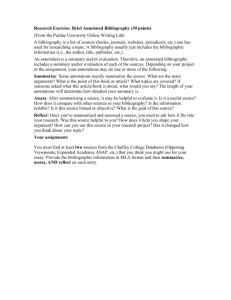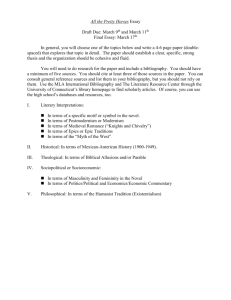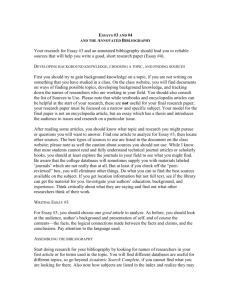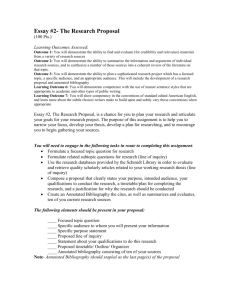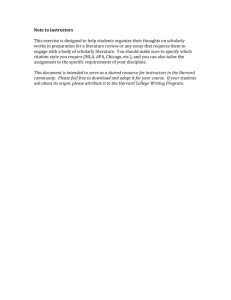Paper 4
advertisement
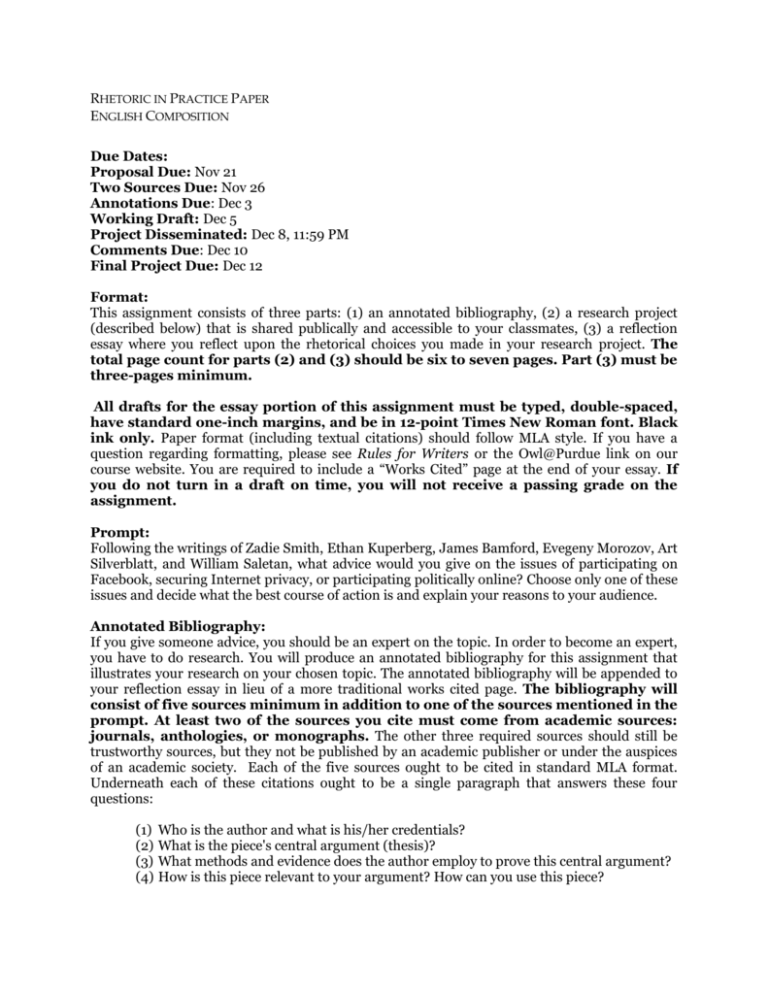
RHETORIC IN PRACTICE PAPER ENGLISH COMPOSITION Due Dates: Proposal Due: Nov 21 Two Sources Due: Nov 26 Annotations Due: Dec 3 Working Draft: Dec 5 Project Disseminated: Dec 8, 11:59 PM Comments Due: Dec 10 Final Project Due: Dec 12 Format: This assignment consists of three parts: (1) an annotated bibliography, (2) a research project (described below) that is shared publically and accessible to your classmates, (3) a reflection essay where you reflect upon the rhetorical choices you made in your research project. The total page count for parts (2) and (3) should be six to seven pages. Part (3) must be three-pages minimum. All drafts for the essay portion of this assignment must be typed, double-spaced, have standard one-inch margins, and be in 12-point Times New Roman font. Black ink only. Paper format (including textual citations) should follow MLA style. If you have a question regarding formatting, please see Rules for Writers or the Owl@Purdue link on our course website. You are required to include a “Works Cited” page at the end of your essay. If you do not turn in a draft on time, you will not receive a passing grade on the assignment. Prompt: Following the writings of Zadie Smith, Ethan Kuperberg, James Bamford, Evegeny Morozov, Art Silverblatt, and William Saletan, what advice would you give on the issues of participating on Facebook, securing Internet privacy, or participating politically online? Choose only one of these issues and decide what the best course of action is and explain your reasons to your audience. Annotated Bibliography: If you give someone advice, you should be an expert on the topic. In order to become an expert, you have to do research. You will produce an annotated bibliography for this assignment that illustrates your research on your chosen topic. The annotated bibliography will be appended to your reflection essay in lieu of a more traditional works cited page. The bibliography will consist of five sources minimum in addition to one of the sources mentioned in the prompt. At least two of the sources you cite must come from academic sources: journals, anthologies, or monographs. The other three required sources should still be trustworthy sources, but they not be published by an academic publisher or under the auspices of an academic society. Each of the five sources ought to be cited in standard MLA format. Underneath each of these citations ought to be a single paragraph that answers these four questions: (1) (2) (3) (4) Who is the author and what is his/her credentials? What is the piece's central argument (thesis)? What methods and evidence does the author employ to prove this central argument? How is this piece relevant to your argument? How can you use this piece? Although I have outlined four questions for you, your entries most likely will have to be longer than four sentences. Ambitious students will seek out additional sources—after all, not every source is useful in the end—but they are only required to annotate five sources. Research Project (Rhetoric in Practice): Once you become an expert on the question above, you will produce a text that provides advice to your given audience. This text can take many forms, however it must be publically accessible to your fellow classmates and your imagined audience. For instance, you might choose to do the following: (1) An open letter delivered online (e.g., Jay Rosen’s “The People Formerly Known as the Audience” (2) A well-designed public service announcement flyer posted online or put up around campus (e.g., see student sample on the course website) (3) A Youtube video that advises people on one of the issue above (e.g, see student sample on the course website) (4) A blog entry for a blog devoted to digital culture (5) A website that addresses one of the above mentioned concerns (6) A Powerpoint or Prezi presentation that you will deliver in front of the class (e.g, see Prezi’s on the course website) (7) Something else that you run by me in your research proposal Reflection Piece The last part of the assignment asks you to write an essay justifying your rhetorical choices in the annotation by relying on the five canons of rhetoric: (1) (2) (3) (4) (5) Invention: developing what to say Arrangement: the order of your ideas, the structure of your argument Style: the way you used language Delivery: the way you delivered your message; consider genre Memory: literally memory, but also the way your research aided your argument. This essay should explore what you hoped to accomplish and where you think you could have improved, given the feedback you received from your peers. While this essay is more selfreflective than our previous assignments, it should still be motivated by a strong thesis and organized in a systematic, logical way. Audience: As part of this project, you will determine the audience for the advice that you are to give. This audience should be apparent either by the method of delivery, the way you present your ideas, or through the content of your rhetoric-in-practice text. Everyone, the general public, or the American people are not audiences that you can hope to reach. Be specific. The audience for your annotated bibliography is me, your instructor, Professor Adam Kaiserman. This is a helpful exercise that (1) ensures that you have done your research (it’s very easy to tell when you haven’t from your annotations and (2) helps you to keep track of your research. Notes: Begin researching as soon as possible. To be as blunt as possible: procrastination means failure. For some, procrastination means plagiarism, which not only means failure but suspension or expulsion from school. Don’t let this happen to you. You cannot begin your research at the last minute. Again, start your research as soon as possible. You will have to narrow the field of your research. Obviously, you cannot address everything about social media and politics or privacy in a single class assignment. Don’t even try. Rather, narrow your scope to one particular aspect such as online privacy, government surveillance, etc. More focused research will produce more focused papers. To be blunt again: focused = triple plus good. Anxieties: This assignment will pose new challenges for many of you. However, it also provides you the opportunity to think about rhetoric in new contexts and to think about how your writing functions socially in the world at large. If you are new to online publishing venues, don’t panic. Many online venues are free to use (Wordpress, Blogger, Prezi, Youtube) and many of them provide helpful templates for making your work appear aesthetically beautiful. Don’t be afraid to use these templates. If you do have a certain amount of web expertise, this is a moment for you to shine. Above all, be clear but be creative. Steps in the Process: Step 1: Develop a research timeline for yourself. Being a good researcher in a limited amount of time means budgeting your time wisely. Step 2: Develop a strategy for how you will present your annotation. Explore various options in terms of delivery. Think about what will work best for you given your skills and proclivities. Step 3: Write down your topic in the broadest sense. Step 4: Work with the topic by asking a pointed question based on a close analysis of the text. Step 5: Revise the narrowed topic to be more specific. Step 6: Identify significant aspects of that topic to explore. Step 7: Use the library resources available to you (both databases and the books on the shelves) to help you find out more about those significant aspects. Take copious notes as you read for your annotations. As you finish a text, produce your annotations. Step 8: Use the answer to these questions to refocus the topic. Step 9: Gather all the relevant information from your sources and organize it so that it becomes more useful. I find it helpful to retype important passages before hand into a word document. You might find it useful to take photos. Step 10: Develop a working outline for your text. You have a lot of information to deal with and this will help you manage it all. Step 11: Produce your working draft (6 pages minimum) by December 5. Step 11: Receive and give comments by December 10, take this into account when finalizing your reflection essay (3 pages minimum) Step 12: Complete paper by December 12.

